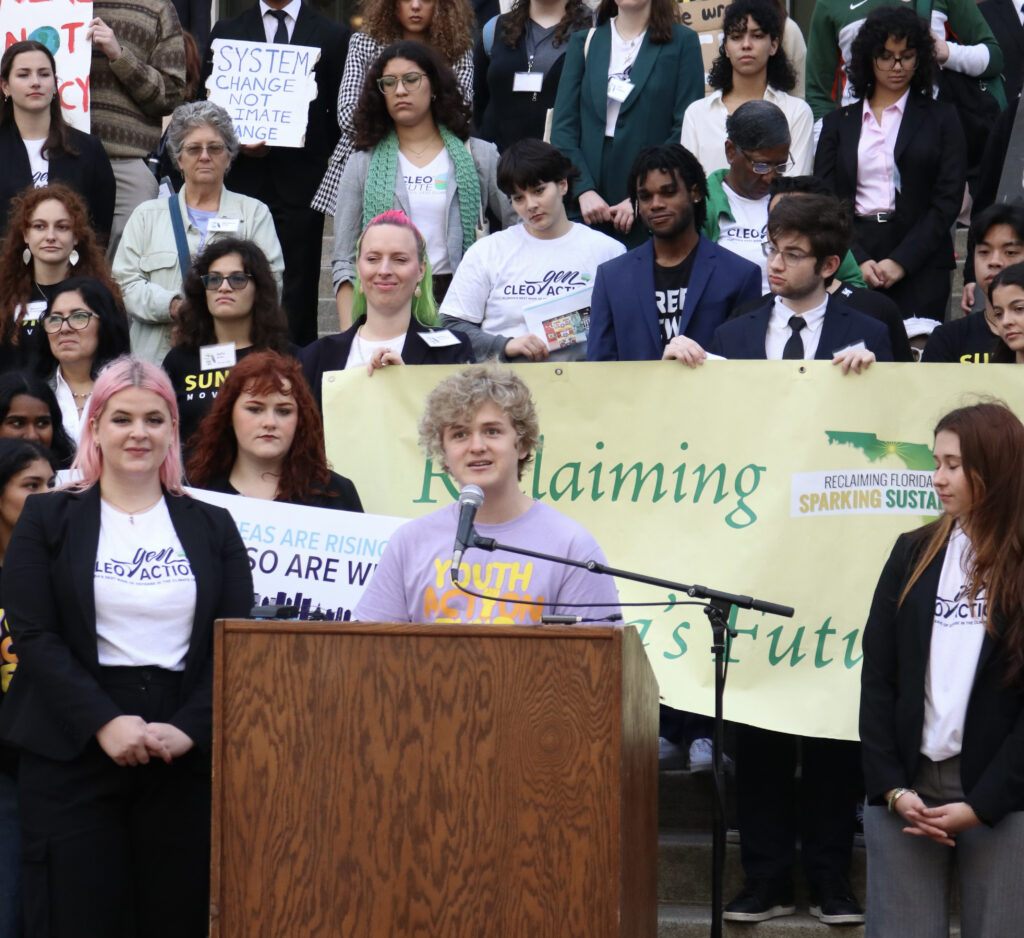By Cameron Driggers, Youth Action Fund
In a move seemingly torn out of the screenplay of “Don’t Look Up,” Adam McKay’s parody of climate denialism, Gov. Ron DeSantis recently signed a bill to largely erase mentions of climate change from state statutes. This decision, in its unimaginable detachment from reality, has wrought national uproar. Yet, the bill’s signing comes as no surprise given DeSantis’ persistent effort to redefine reality as he sees fit.
Of course, the climate crisis does not care if it is mentioned in state law. Last week, vast swaths of the state faced catastrophic flooding. At the same time, Florida and many of its equatorial neighbors in Central America have experienced an unprecedented heat dome compounded by drought.
Water temperatures within the Gulf of Mexico and the Caribbean continue to rise, foreshadowing even more destructive coral bleaching events than have already taken place in recent years. Perhaps most alarming of all is that the rapid warming of the water surrounding Florida spells near-certain disaster as the state enters its annual hurricane season.
While Floridians may be forced to survive within the crosshairs of raging storms, sweltering heat and a waning ecosystem, they can at least rest assured that their plight won’t be acknowledged in state law thanks to Gov. DeSantis.

At the beginning of this year’s spring legislative session, more than 200 students from across the state converged on the state Capitol in Tallahassee to demand passage of key bills regarding climate action, sustainability and resiliency. In fact, this event reportedly marked the largest gathering of environmental activists in Florida’s history.
I helped mobilize many of those who took part that day, some as young as 14 years old, and what motivated them to take action was certainly not the validation of some politician, but their own experiences suffering from the climate crisis and its onset of an increasingly inhospitable environment.
This is indicative of a wider shift in the state of climate change, as it is no longer confined to statistical forecasting and a distant future; It is happening right now, with anecdotes of that fact becoming ever more present among ordinary Floridians. Whether it be the raging heat, flooded homes and streets, or household stress as a result of skyrocketing property insurance costs, the reality of the climate crisis is staring Florida’s young people in the face. And much to DeSantis’ chagrin, he cannot assuage us of what we are seeing and feeling with our own eyes and bodies.
Outside the apathetic halls of the Capitol, students have continued to take the initiative themselves to fight the crisis themselves. The efforts of myself and other students at the University of Florida, the state’s flagship learning institution, made national headlines in February when our “Green New Deal For UF” resolution was passed unanimously by UF’s elected student government; representing the first legislation of its kind to be passed by any public university in the United States. This resolution, among other things, procured a mandate to decarbonize campus facilities and transportation and divest completely from fossil fuels.
This resolution was delivered to DeSantis’ office itself, and was promptly ignored, despite the resolution’s request to reconsider a plethora of restrictions he signed into law which prohibit basic measures to reign in contributing factors to climate change.
Instead, DeSantis’ ally at the helm of our university, Ben Sasse, moved to gut funding of public transportation for students. After a protracted period of student organizing in opposition, Sasse was forced to back down. This is but one instance of students fighting for a sustainable future, and winning too!
While it’s clear that in Florida we cannot look to our elected leaders to appreciate the gravity of the crisis in which we found ourselves on the frontlines, there remains hope to be gleaned from the efforts of young people who are successfully fighting for sensical action locally and across the state.
Simply put, we understand that overcoming this daunting challenge cannot be overcome by simply ignoring it, but by actually taking action.
Cameron Driggers is a student activist and organizer currently based at the University of Florida in Gainesville. Driggers serves as the founder and executive director of Youth Action Fund, a charitable organization that provides resources to young Floridians leading community organizing initiatives.
If you are interested in submitting an opinion piece to The Invading Sea, email Editor Nathan Crabbe at ncrabbe@fau.edu. Sign up for The Invading Sea newsletter by visiting here.



